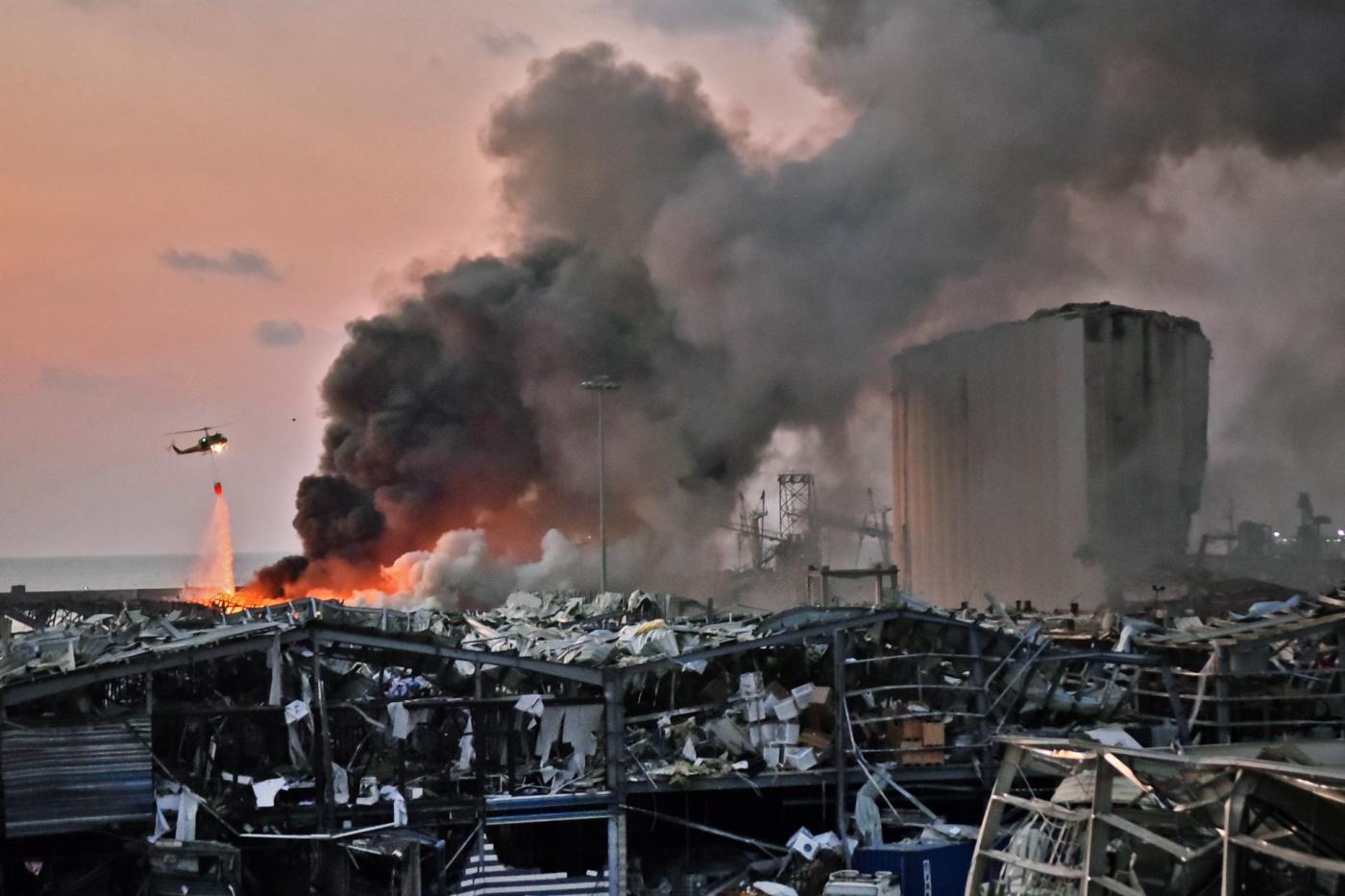BEIRUT: An already-overwhelmed Lebanon fell to its knees after a massive explosion that ripped through neighborhoods across the capital and flattened much of the country’s main port on Tuesday, killing at least 100 people and leaving thousands wounded.
Residents of Beirut awoke to a scene of utter devastation, as Lebanon plunged deeper into misery. Officials report that 2,750 tonnes of confiscated ammonium nitrate caused the explosion at the Beirut Port and that an investigation was under way to find the exact trigger, which remains unclear.
Videos showed what appeared to be a fire erupting nearby just before, and local TV stations reported that a fireworks warehouse was involved. The fire appeared to spread to a nearby building, triggering the more massive explosion, sending up a mushroom cloud and generating a shockwave felt kilometers away from the city.
The highly-flammable chemical compound had reportedly been unloaded from a ship impounded at the port in 2013, and then unsafely stored in a warehouse there for six years, according to statements from both the prime minister and presidency.
Lebanon’s Supreme Defence Council said those responsible would face “maximum punishment.” The Lebanese Cabinet also tasked the army with placing all officials who oversaw storage and guarding at Beirut Port since 2014 under house arrest pending the end of the investigation.
The port is a major commercial route that has provided Lebanon, a country that relies heavily on imports, with a lifeline of nearly all needed goods. With its largest port and essential importing facility devastated by the blast, analysts are concerned how Lebanon can maintain the flow of much-needed food, and medical supplies.
The explosion also comes at a sensitive time for Lebanon, with an economic crisis reigniting old divisions and the country struggling to control a renewed wave of COVID-19. Tensions are also high ahead of Friday’s verdict in a UN-backed trial over the killing of ex-Prime Minister Rafik Hariri in 2005.
Can food security and the economy be maintained after the destruction of Beirut Port?
For now, says Deeba Shadnia, a Middle East and North Africa analyst, “the traffic is being diverted to Tripoli Port, which might help in the short term, and make up for the immediate loss of food supplies.”
But Tripoli Port has a much smaller capacity than the Beirut Port, Shadnia said. “Given the destruction in [Beirut] port, it’s likely Tripoli will be the main point of access for the foreseeable future,”
“Certainly for the next year or so,” she said.
On Wednesday, drone footage from the Associated Press (AP) showed that the blast tore open Lebanon’s main grain silos at the port, dumping their content into the debris.
Lebanon’s state-run National News Agency quoted Minister of Economy and Trade Raoul Nehme as saying that all the wheat stored at the facility had been “contaminated” and couldn’t be used.
However, he insisted Lebanon had enough wheat for its immediate needs. Nehme added that Lebanon would also import more wheat.
The port’s grain silo is run by the Lebanese Ministry of Economy and Trade. According to local officials, most of the silos were relatively empty. Nehme also told Reuters that the destroyed silos only contained 15,000 tonnes of grain at the time of the blast, while the capacity stands at 120,000 tonnes.
“There has been speculation that there was around three to four months of stock of grains and wheat,” said Shadnia.
However, at a time where the average Lebanese family is struggling to make ends meet, any amount of stock lost in the blast is nonetheless a significant blow.
“It’s incomprehensible to think about how difficult it will be for people to rebuild their homes when many of them struggle to cover the costs of their rent, and put food on the table,” Shadnia added.
“Years of inaction” sparked the Beirut Blast
The economic collapse and chronic government inefficiency will have a devastating and long lasting impact on the most vulnerable communities in Lebanon.
“What happened in Beirut was a catastrophe and a turning point,” said Chadi Nachabe, political analyst in Lebanon. “This will have a major effect on the country’s politics, and economy…[Lebanon] will feel the effects in coming days.”
In a recent statement, the governor of Beirut said the blast has left up to 300,000 homeless and a total cost of $3 billion in damages that extends over half the city.
Meanwhile, Reuters reported an official source familiar with the findings saying the initial investigations into the blast in Beirut Port indicate years of inaction and negligence over safety measures and the storage of highly explosive material.
Images reminiscent of the Civil War showed wrecked cars and blast-damaged buildings. The blast wave ripped through entire neighborhoods across the Lebanese capital, leaving major downtown roads blood-stained, littered with debris, shredded building facades and broken glass.
In the wake of the explosion, Prime Minister Hassan Diab addressed the country saying that what happened today “will not fly by without accountability. All those responsible for this catastrophe will pay the price.”
“We are facing a catastrophe. But I am confident that we will handle it with great responsibility,” he said.
On the other hand, Shadnia believes a local mobilization will “step in to fill the void left by an absent government that’s not capable of managing the country, even in times of crisis.”


